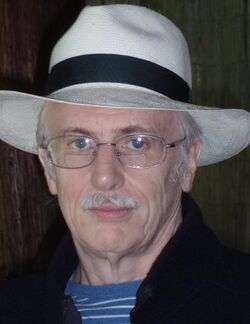Charles Thorn
Topic: Biography
 From HandWiki - Reading time: 2 min
From HandWiki - Reading time: 2 min
Charles Thorn | |
|---|---|
 | |
| Born | 14 August 1946 (age 77) Washington, Indiana |
| Nationality | United States |
| Alma mater | Massachusetts Institute of Technology University of California, Berkeley |
| Awards | Jesse W. Beams Medal, 2005 |
| Scientific career | |
| Fields | Physics |
| Institutions | University of Florida |
| Doctoral advisor | Stanley Mandelstam |
Charles Thorn (born 14 August 1946) is a Professor of Physics at University of Florida in Gainesville, Florida.[1] He played an important role in the development of Dual Models and string theory.[2] Among his contributions is the proof of the non-existence of ghosts in string theory. The Goddard–Thorn theorem is a mathematical theorem about certain vector spaces in string theory. Thorn developed it with Peter Goddard.
Education and personal life
Thorn obtained his undergraduate degree in Physics at Massachusetts Institute of Technology (MIT) and completed his Ph.D in Physics from University of California, Berkeley in 1971 under the supervision of Stanley Mandelstam. He has held postdoctoral positions at MIT and CERN. He is fond of tango dancing.
Research
Charles Thorn also has developed an approach to string theory based on the idea of string bits.[3][4] This idea led him to the conclusion that in this formalism one of the dimensions of spacetime appears to be dynamic. The fundamental degrees of freedom propagated on a surface in one lower dimension thus giving a holographic theory.
References
- ↑ Charles Thorn at University of Florida
- ↑ Goddard P. From dual models to string theory, The Birth of String Theory (18–19 May 2007)] arXiv:0802.3249v1 (accessed 16 April 2008)
- ↑ Strings Branes and Gravity. Jeffrey A. Harvey, Shamit Kachru, Eva Silverstein. World Scientific TASI 1999
- ↑ Reformulating String Theory with the 1/N expansion. arXiv:hep-th/9405069
External links
- Charles Thorn publications indexed by Google Scholar
- Personal Page of Charles Thorn
- Publications on ArXiv
- Spires
 KSF
KSF